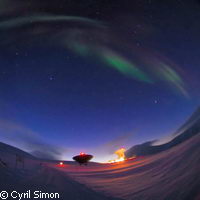Jean Lilensten wins first Europlanet prize for excellence
Dr Jean Lilensten of the Laboratoire de Planétologie de Grenoble in France has won the first Europlanet prize for excellence in public engagement with planetary science. The Europlanet Research Infrastructure is a EUR 6 million programme partially funded by the EU under the Seventh Framework Programme (FP7). Among other things, it is helping drive the EU's quest to raise awareness of science and improve science education in Europe. Dr Lilensten will receive his EUR 4,000 award at the European Planetary Science Congress 2010, which will be held in Rome, Italy, in September this year. For over a decade, Dr Lilensten has been diligent in his pursuit to help school children better understand and appreciate the planetary aurorae. The fruits of his labour culminated in a wondrous experiment called 'planeterrella'. The basis for developing the planeterrella goes back to the early 1900s when the Norwegian scientist Kristian Birkeland, initially described how the solar wind's interaction with the Earth's magnetic field triggered the Northern Lights. In time, Dr Birkeland successfully recreated the ethereal glow of the aurora at the sphere's poles by aiming a beam of electrons at a magnetised sphere, the 'terrella', inside a glass vacuum chamber. Dr Lilensten decided to build a number of terrellas with colleagues and students. His objective was to create a portable, flexible version that not only scientists could use but that would also encourage interaction between the experts and the general public. Thanks to the planeterrella experiment, Dr Lilensten also demonstrated other astronomical phenomena, including the auroral effects at Uranus and Neptune, the Van Allen radiation belts, the magnetopause and stellar ring currents and jets. Dr Lilensten has already trained colleagues and students in the art of demonstrating the planeterrella. The Laboratoire de Planétologie de Grenoble hosts around two demonstrations each month, and the experiment has journeyed across France, and has been shown on French and German television. Those interested in finding out more about the experiment and the aurorae, among other things, can visit the planeterrella website developed by Dr Lilensten. In another development, Dr Lilensten is helping others in Italy, Switzerland and the UK who are keen on building their own versions. The aurorae, commonly known as the Northern and Southern Lights, are sparkling lightshows, rich in red, blue and green hues, which emerge around the Earth's magnetic poles. While they are fascinating to the eye, they also play a pivotal role in helping scientists better understand the space environment surrounding our planet - what experts call 'our space weather'. Commenting on the prize, Dr Lilensten said: 'I am very pleased to receive this award. I am sure that this important recognition will also be an award for my laboratory and all the friends who supported me in these outreach activities.' For his part, Europlanet Outreach Coordinator Dr Thierry Fouchet said: 'Dr Lilensten deserves recognition, not just for his dedication in developing planeterrella and his inspirational demonstrations, but also for his generosity in sharing his expertise and making the plans for the planeterrella available so that his spectacular outreach tool can be used more widely. 'Through this Europlanet prize, we hope to encourage outreach within the planetary science community and we are delighted that this first prize will go to someone who has shown such a strong commitment to collaboration and sharing best practice.' The Europlanet consortium is comprised of 27 institutions from 13 EU Member States and 3 other European countries. Experts from Brazil, Japan and the US are also contributing to the programme.
Countries
Brazil, Switzerland, Germany, France, Italy, Japan, United States

